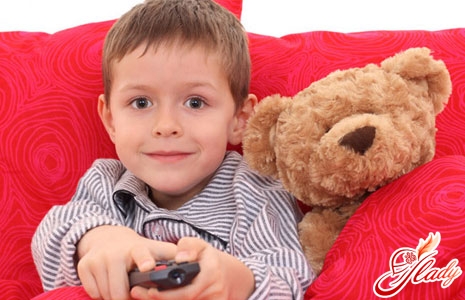 Child and TV … TV for a long time andпрочно вошел в жизнь современного человека. И, конечно же, в жизнь ребенка. Ребенок, смотрящий телевизор – абсолютно рядовое явление в современном мире. И далеко не всегда родители задумываются о том, можно ли детям смотреть телевизор и в каких количествах. Чтобы ответить на эти вопросы, необходимо знать, каково же влияние телевизора на детей. Почему же дети так любят телевизор? Психологи объясняют этот факт тем, что изображение на экране зачастую отвлекает ребенка от реального мира. И если, например, при походе в кинотеатр ребенок в полной мере осознает нереальность происходящего на экране, то дома он получает новую информацию с экрана телевизора в абсолютно привычной для него домашней обстановке, а не в кинозале. Именно это и путает мозг малыша, заставляя принимать за реальное действие все происходящее на экране телевизора. Ребенку очень сложно самостоятельно самоустраниться от происходящего на экране, вследствие чего этот завораживающий эффект многократно усиливается. Очень много споров вызывает вопрос «телевизор и грудной ребенок». Многие родители считают, что совсем маленькие детки до определенного возраста вообще не воспринимают происходящего на экране. Отчасти такая точка зрения верна – дети в силу своих возрастных особенностей не способны уловить суть происходящих действий не только на экране, но и в жизни. Однако многочисленные исследования доказали, что уже месячные дети способны концентрировать внимание на движущейся картинке телевизора. И подобные картинки крайне негативно влияют на подсознание крохи, истощая его нервную систему. А привыкание к телевизору происходит очень и очень быстро. Наверняка все родители неоднократно замечали, как кроха радостно начинал смеяться, заслышав звуки знакомой рекламы или музыкальной заставки какой-либо программы. Примерно с трех – четырехлетнего возраста ребенок уже в состоянии уловить смысл происходящего на экране, однако они совершенно не умеют разграничивать вымысел, происходящее на экране и реальность. Именно поэтому родители должны быть крайне щепетильными при выборе передач для просмотра ребенка. Старайтесь избегать любых программ, содержащих сцены насилия, жестокости, страшных сцен, которые могут напугать ребенка. Время просмотра мультиков также необходимо ограничить. Ведь мультики, в любом случае, являются для ребенка сильным раздражителем и перегружают его нервную систему. Следующий аспект — сколько можно ребенку смотреть телевизор? Детские психологи рекомендуют ограничить время просмотра телевизора примерно 15 минутами в сутки для детей от трех до семи лет. Обязательно обращайте внимание на то, какие именно мультики смотрит ваш ребенок. Не стоит давать малышу смотреть мультики, в которых пропагандируется жестокость и агрессия. Ведь именно в этом возрасте у ребенка крайне сильно выражена способность к идентификации себя с мультипликационными героями и, как следствие, подражание их поведению. Примерно к семи годам дети становятся способными отличить действия, происходящие на экране от реальной жизни. В это время вы можете слегка расширить круг просматриваемых передач, однако не забывая следить за тем, чтобы в них не было жестоких сцен. Время просмотра также можно увеличить примерно до получаса в сутки. И только к десяти годам дети приобретают способность в полной мере способность воспринимать и объективно оценивать время и пространство, анализировать, рассуждать и делать выводу, а также отличать вымысел от реальности. В этом возрасте для ребенка на первый план при просмотре телепередач выходит смысл увиденного, а не зрительные образы, как раньше. Примерно в этом возрасте дети уже могут сами выбирать те телепередачи, которые они хотят посмотреть. Однако и в этом возрасте родители в обязательном порядке должны внимательно следить за выбором ребенка. Ведь именно в этом возрасте у него происходит самосознание себя, как личности. Переоценка ценностей, становление своего я и формирование собственного мнения. И гораздо разумнее, чтобы в этот период на сознание ребенка не влияли негативные образы телевизионных героев, зачастую совсем не положительных. Мальчики в этот период начинают отождествлять себя с красивыми, сильными и мужественными героями, которые зачастую оказываются далеко не положительными персонажами, а зачастую откровенно отрицательными. Девочки же зачастую стараются походить на телевизионных красавиц, изнуряя себя диетами с самых малых лет. Также зачастую родители задают детским психологам вопрос по поводу того, с какого возраста можно разрешать детям самостоятельно смотреть телевизор, без присутствия взрослых. Конечно же, изредка, если маме необходимо некоторое количество свободного времени, она может поставить диск с мультфильмами и оставить трехлетнего кроху посмотреть их самостоятельно. Однако подобные сеансы не должны становиться правилом. Ребенку в первую очередь необходимо внимание родителей. Примерно с семилетнего возраста ребенку можно позволять смотреть телевизор самостоятельно, при условии, что вы точно знаете, какие именно программы смотрит ваш ребенок. А вообще совместный просмотр телепередач является прекрасным времяпровождением и позволяет родителям направить развитие ребенка в необходимое русло. Родители должны заранее договориться со своим малышом о том, какое количество времени он будет смотреть телевизор. Вы можете выбрать определенное количество часов в сутки или в неделю, но ребенок должен точно знать. Какое количество времени он может провести перед телевизором. Конечно же, это не поможет полностью предотвратить просьбы «Ну можно еще чуть – чуть посидеть?», однако поможет свести капризы к возможному минимуму. Для того чтобы достичь максимального эффекта, не стоит концентрировать внимание ребенка именно на времени просмотра телевизора — гораздо эффективнее будет, если вы с ребенком вместе уделите время выбору тех программ или мультфильмов, которые ребенок будет смотреть на предстоящей неделе. Подобная мера позволит ребенку ощущать себя полноправным участником всех событий, происходящих в его семье, а не быть простым пассивным наблюдателем. Помните о том, что вашу договоренность с ребенком необходимо пересматривать заново каждую неделю. Помимо того, сколько времени ребенок будет смотреть телевизор, необходимо обговорить то, в какое именно время ребенок будет смотреть телевизор – вечером ли, в выходные ли дни. Можете вместе с ребенком решить, будет ли он смотреть телевизор каждый день понемногу, либо же подольше в выходные дни. Даже после того, как ребенок подрастет и станет самостоятельно выбирать себе телепередачи, родители должны контролировать то, что смотрит ребенок. И именно слово родителей должно быть решающим в выборе передач для просмотра. Конечно же, родителям очень сложно постоянно контролировать ребенка, особенно если он уже достаточно взрослый. Для того чтобы ребенок беспрекословно выполнял то, что ему велят родители, к правилам его необходимо начинать приучать в самом раннем возрасте. Если ребенок с малых лет будет знать, что слово родителей – это закон для него, родителям не придется применять никаких санкционных мер. Однако ни в коем случае не стоит не стоит просто запрещать что-то ребенку, ничем не мотивируя свой аппрет. Это может вызвать реакцию протеста у ребенка. Старайтесь всегда обосновывать свои решения – это поможет ребенку быстрее принять их.
Child and TV … TV for a long time andпрочно вошел в жизнь современного человека. И, конечно же, в жизнь ребенка. Ребенок, смотрящий телевизор – абсолютно рядовое явление в современном мире. И далеко не всегда родители задумываются о том, можно ли детям смотреть телевизор и в каких количествах. Чтобы ответить на эти вопросы, необходимо знать, каково же влияние телевизора на детей. Почему же дети так любят телевизор? Психологи объясняют этот факт тем, что изображение на экране зачастую отвлекает ребенка от реального мира. И если, например, при походе в кинотеатр ребенок в полной мере осознает нереальность происходящего на экране, то дома он получает новую информацию с экрана телевизора в абсолютно привычной для него домашней обстановке, а не в кинозале. Именно это и путает мозг малыша, заставляя принимать за реальное действие все происходящее на экране телевизора. Ребенку очень сложно самостоятельно самоустраниться от происходящего на экране, вследствие чего этот завораживающий эффект многократно усиливается. Очень много споров вызывает вопрос «телевизор и грудной ребенок». Многие родители считают, что совсем маленькие детки до определенного возраста вообще не воспринимают происходящего на экране. Отчасти такая точка зрения верна – дети в силу своих возрастных особенностей не способны уловить суть происходящих действий не только на экране, но и в жизни. Однако многочисленные исследования доказали, что уже месячные дети способны концентрировать внимание на движущейся картинке телевизора. И подобные картинки крайне негативно влияют на подсознание крохи, истощая его нервную систему. А привыкание к телевизору происходит очень и очень быстро. Наверняка все родители неоднократно замечали, как кроха радостно начинал смеяться, заслышав звуки знакомой рекламы или музыкальной заставки какой-либо программы. Примерно с трех – четырехлетнего возраста ребенок уже в состоянии уловить смысл происходящего на экране, однако они совершенно не умеют разграничивать вымысел, происходящее на экране и реальность. Именно поэтому родители должны быть крайне щепетильными при выборе передач для просмотра ребенка. Старайтесь избегать любых программ, содержащих сцены насилия, жестокости, страшных сцен, которые могут напугать ребенка. Время просмотра мультиков также необходимо ограничить. Ведь мультики, в любом случае, являются для ребенка сильным раздражителем и перегружают его нервную систему. Следующий аспект — сколько можно ребенку смотреть телевизор? Детские психологи рекомендуют ограничить время просмотра телевизора примерно 15 минутами в сутки для детей от трех до семи лет. Обязательно обращайте внимание на то, какие именно мультики смотрит ваш ребенок. Не стоит давать малышу смотреть мультики, в которых пропагандируется жестокость и агрессия. Ведь именно в этом возрасте у ребенка крайне сильно выражена способность к идентификации себя с мультипликационными героями и, как следствие, подражание их поведению. Примерно к семи годам дети становятся способными отличить действия, происходящие на экране от реальной жизни. В это время вы можете слегка расширить круг просматриваемых передач, однако не забывая следить за тем, чтобы в них не было жестоких сцен. Время просмотра также можно увеличить примерно до получаса в сутки. И только к десяти годам дети приобретают способность в полной мере способность воспринимать и объективно оценивать время и пространство, анализировать, рассуждать и делать выводу, а также отличать вымысел от реальности. В этом возрасте для ребенка на первый план при просмотре телепередач выходит смысл увиденного, а не зрительные образы, как раньше. Примерно в этом возрасте дети уже могут сами выбирать те телепередачи, которые они хотят посмотреть. Однако и в этом возрасте родители в обязательном порядке должны внимательно следить за выбором ребенка. Ведь именно в этом возрасте у него происходит самосознание себя, как личности. Переоценка ценностей, становление своего я и формирование собственного мнения. И гораздо разумнее, чтобы в этот период на сознание ребенка не влияли негативные образы телевизионных героев, зачастую совсем не положительных. Мальчики в этот период начинают отождествлять себя с красивыми, сильными и мужественными героями, которые зачастую оказываются далеко не положительными персонажами, а зачастую откровенно отрицательными. Девочки же зачастую стараются походить на телевизионных красавиц, изнуряя себя диетами с самых малых лет. Также зачастую родители задают детским психологам вопрос по поводу того, с какого возраста можно разрешать детям самостоятельно смотреть телевизор, без присутствия взрослых. Конечно же, изредка, если маме необходимо некоторое количество свободного времени, она может поставить диск с мультфильмами и оставить трехлетнего кроху посмотреть их самостоятельно. Однако подобные сеансы не должны становиться правилом. Ребенку в первую очередь необходимо внимание родителей. Примерно с семилетнего возраста ребенку можно позволять смотреть телевизор самостоятельно, при условии, что вы точно знаете, какие именно программы смотрит ваш ребенок. А вообще совместный просмотр телепередач является прекрасным времяпровождением и позволяет родителям направить развитие ребенка в необходимое русло. Родители должны заранее договориться со своим малышом о том, какое количество времени он будет смотреть телевизор. Вы можете выбрать определенное количество часов в сутки или в неделю, но ребенок должен точно знать. Какое количество времени он может провести перед телевизором. Конечно же, это не поможет полностью предотвратить просьбы «Ну можно еще чуть – чуть посидеть?», однако поможет свести капризы к возможному минимуму. Для того чтобы достичь максимального эффекта, не стоит концентрировать внимание ребенка именно на времени просмотра телевизора — гораздо эффективнее будет, если вы с ребенком вместе уделите время выбору тех программ или мультфильмов, которые ребенок будет смотреть на предстоящей неделе. Подобная мера позволит ребенку ощущать себя полноправным участником всех событий, происходящих в его семье, а не быть простым пассивным наблюдателем. Помните о том, что вашу договоренность с ребенком необходимо пересматривать заново каждую неделю. Помимо того, сколько времени ребенок будет смотреть телевизор, необходимо обговорить то, в какое именно время ребенок будет смотреть телевизор – вечером ли, в выходные ли дни. Можете вместе с ребенком решить, будет ли он смотреть телевизор каждый день понемногу, либо же подольше в выходные дни. Даже после того, как ребенок подрастет и станет самостоятельно выбирать себе телепередачи, родители должны контролировать то, что смотрит ребенок. И именно слово родителей должно быть решающим в выборе передач для просмотра. Конечно же, родителям очень сложно постоянно контролировать ребенка, особенно если он уже достаточно взрослый. Для того чтобы ребенок беспрекословно выполнял то, что ему велят родители, к правилам его необходимо начинать приучать в самом раннем возрасте. Если ребенок с малых лет будет знать, что слово родителей – это закон для него, родителям не придется применять никаких санкционных мер. Однако ни в коем случае не стоит не стоит просто запрещать что-то ребенку, ничем не мотивируя свой аппрет. Это может вызвать реакцию протеста у ребенка. Старайтесь всегда обосновывать свои решения – это поможет ребенку быстрее принять их.
TV in the children's room
 Many parents buy TVспециально для детской комнаты. Однако детские психологи утверждают, что детская комната – наиболее неподходящее место для телевизора. Если телевизор является постоянным фоном, это мешает ребенку найти для себя более подходящее занятие, чем просмотр телевизора. В том случае, если у ребенка будет свободный доступ к просмотру мультиков и фильмов, он наверняка не захочет читать книги, играть в какие – либо развивающие игры, что просто необходимо для его гармоничного развития и самосознания. Очень часто у родителей и детей не совпадают взгляды на какие – либо передачи. То, что нравится родителям, может не нравиться ребенку, и наоборот. Не стоит пользоваться своим родительским авторитетом и просто запрещать ребенку просмотр его любимых телепередач и навязывать свою точку зрения. Гораздо разумнее пойти на компромисс и вместе с ребенком посмотрите и те передачи, которые нравятся ему, и те, которые нравятся вам. После этого обязательно обсудите, что именно нравится вам и не нравится ребенку, а также наоборот. Возможно, после совместного просмотра телепередач вам удастся переубедить ребенка, а возможно, вы и сами измените свое мнение. Не меньше вопросов у родителей вызывает и реклама, которую в огромных количествах показывают по телевизору. Наиболее актуален этот вопрос в отношении самых маленьких деток. Уже годовалые крохи замечательно распознают звуки любимой рекламы, а также логотипы товаров. Однако назначение рекламных роликов дети оказываются способными воспринимать только примерно с семилетнего возраста. Если речь идет о маленьких детишках, проблема с рекламой решается очень просто – достаточно просто переключить канал, или выключить телевизор. А вот с детьми постарше немного сложнее. Родители должны обязательно разговаривать с детьми, объясняя им предназначение рекламы. Это поможет избежать истерик в магазине, когда ребенок будет требовать купить какую – либо вещь в магазине, которую ранее он видел в рекламном ролике по телевизору. Очень часто родители, контролируя, чтобы дети не видели взрослых фильмов и передач, содержащих сцены насилия и жестокости, совершенно спокойно включают выпуск информационных программ, не обращая внимание на присутствие в комнате ребенка. Однако взрослые очень часто забывают о том, что реалии жизни, показываемые в выпуске новостей, зачастую оказываются намного страшнее и более жестокими, чем сцена самого кровавого боевика. Старайтесь не допускать просмотра информационных телепередач детьми младше 8 – 9 лет. Маленькие дети очень тяжело воспринимают чужие переживания и боль, очень быстро и в полной мере проецируя все беды на себя и своих родных. Не стоит их подвергать лишним психологическим нагрузкам. Если же все-таки так вышло, что ребенок увидел сцену, содержащую насилие или какую – либо катастрофу, обнимите кроху, мягко успокойте его. Это создаст у ребенка иллюзию спокойствия и защищенности. А ведь это самое главное, что необходимо для психологического спокойствия вашего малыша. Однако ни в коем случае не замалчивайте то, что ребенок увидел на экране, а также не пытайтесь просто перевести тему разговора. Это только усугубит психологическое состояние ребенка и усилит его тревогу. Обязательно проговорите увиденное, пояснив ребенку непонятные для него моменты. Обязательно делайте акцент на том, что для спасения людей прикладываются все усилия, и людей не бросят даже в самой опасной ситуации. И последнее, о чем необходимо упомянуть, говоря о влиянии телевизора, это эротические сцены. Разумеется, речь о сексе и насилии даже не идет – родители должны полностью исключить все фильмы и передачи, которые могут содержать подобные сцены. Однако, зачастую, и в фильмах, предназначенных для семейного просмотра, встречаются сцены легкого эротического характера. Как правило, маленькие детки не обращают на подобные сцены никакого внимания. А вот если это увидят дети постарше, у них могут возникнуть вопросы. Не стоит уклоняться от них – подобные сцены могут стать прекрасным поводом поговорить с ребенком о сексуальности и взаимоотношениях полов.
Many parents buy TVспециально для детской комнаты. Однако детские психологи утверждают, что детская комната – наиболее неподходящее место для телевизора. Если телевизор является постоянным фоном, это мешает ребенку найти для себя более подходящее занятие, чем просмотр телевизора. В том случае, если у ребенка будет свободный доступ к просмотру мультиков и фильмов, он наверняка не захочет читать книги, играть в какие – либо развивающие игры, что просто необходимо для его гармоничного развития и самосознания. Очень часто у родителей и детей не совпадают взгляды на какие – либо передачи. То, что нравится родителям, может не нравиться ребенку, и наоборот. Не стоит пользоваться своим родительским авторитетом и просто запрещать ребенку просмотр его любимых телепередач и навязывать свою точку зрения. Гораздо разумнее пойти на компромисс и вместе с ребенком посмотрите и те передачи, которые нравятся ему, и те, которые нравятся вам. После этого обязательно обсудите, что именно нравится вам и не нравится ребенку, а также наоборот. Возможно, после совместного просмотра телепередач вам удастся переубедить ребенка, а возможно, вы и сами измените свое мнение. Не меньше вопросов у родителей вызывает и реклама, которую в огромных количествах показывают по телевизору. Наиболее актуален этот вопрос в отношении самых маленьких деток. Уже годовалые крохи замечательно распознают звуки любимой рекламы, а также логотипы товаров. Однако назначение рекламных роликов дети оказываются способными воспринимать только примерно с семилетнего возраста. Если речь идет о маленьких детишках, проблема с рекламой решается очень просто – достаточно просто переключить канал, или выключить телевизор. А вот с детьми постарше немного сложнее. Родители должны обязательно разговаривать с детьми, объясняя им предназначение рекламы. Это поможет избежать истерик в магазине, когда ребенок будет требовать купить какую – либо вещь в магазине, которую ранее он видел в рекламном ролике по телевизору. Очень часто родители, контролируя, чтобы дети не видели взрослых фильмов и передач, содержащих сцены насилия и жестокости, совершенно спокойно включают выпуск информационных программ, не обращая внимание на присутствие в комнате ребенка. Однако взрослые очень часто забывают о том, что реалии жизни, показываемые в выпуске новостей, зачастую оказываются намного страшнее и более жестокими, чем сцена самого кровавого боевика. Старайтесь не допускать просмотра информационных телепередач детьми младше 8 – 9 лет. Маленькие дети очень тяжело воспринимают чужие переживания и боль, очень быстро и в полной мере проецируя все беды на себя и своих родных. Не стоит их подвергать лишним психологическим нагрузкам. Если же все-таки так вышло, что ребенок увидел сцену, содержащую насилие или какую – либо катастрофу, обнимите кроху, мягко успокойте его. Это создаст у ребенка иллюзию спокойствия и защищенности. А ведь это самое главное, что необходимо для психологического спокойствия вашего малыша. Однако ни в коем случае не замалчивайте то, что ребенок увидел на экране, а также не пытайтесь просто перевести тему разговора. Это только усугубит психологическое состояние ребенка и усилит его тревогу. Обязательно проговорите увиденное, пояснив ребенку непонятные для него моменты. Обязательно делайте акцент на том, что для спасения людей прикладываются все усилия, и людей не бросят даже в самой опасной ситуации. И последнее, о чем необходимо упомянуть, говоря о влиянии телевизора, это эротические сцены. Разумеется, речь о сексе и насилии даже не идет – родители должны полностью исключить все фильмы и передачи, которые могут содержать подобные сцены. Однако, зачастую, и в фильмах, предназначенных для семейного просмотра, встречаются сцены легкого эротического характера. Как правило, маленькие детки не обращают на подобные сцены никакого внимания. А вот если это увидят дети постарше, у них могут возникнуть вопросы. Не стоит уклоняться от них – подобные сцены могут стать прекрасным поводом поговорить с ребенком о сексуальности и взаимоотношениях полов.
Child and computer
 The next one, no less exciting for parents,problem - the influence of the computer on the child. Nowadays, there is a computer in almost every home, and children's acquaintance with the computer begins at a very tender age. Often, a three-year-old can deftly handle a computer mouse. But is it really safe for a child? Is a computer harmful for children? As numerous studies show, even a short time spent at the computer puts a significant strain on both the child's psyche and his visual system. A similar phenomenon is observed in 78% of all children, while a six-hour school day causes the same fatigue in only 43% of children. However, if the child notices fatigue caused by schoolwork right away, then overfatigue caused by computer abuse almost always goes unnoticed. A child carried away by the Internet or computer games is in a state of heightened emotional arousal. And it is this emotional arousal that does not allow them to notice the onset of fatigue in time, and work with the computer continues. As a result, fatigue accumulates like a snowball, gradually bringing the child to complete nervous exhaustion. And if very young children are sitting at the computer, there is no need to even talk about the harm of uncontrolled access to the computer. Often, if the parents are busy, the child spends almost the entire day in front of the computer screen. And in the evening, mothers are surprised why the child becomes so excited, nervous and uncontrollable. The child may not fall asleep for a long time, and having fallen asleep, constantly wake up, or even just scream in his sleep. Parents begin to get nervous, buy children's sedatives. After all measures have been tried, the parents will go to the doctor. And imagine how surprised the parents are when they learn from the doctor that the culprit is such a harmless at first glance computer. However, fortunately, recently parents have become more and more concerned about the issue of "computers and children's health." The harm of a computer to children is most often either underestimated or significantly exaggerated. In first place is the issue of electrical radiation from the computer. Radiation measurements show that X-rays from modern computers do not exceed safe levels. The same is true for electromagnetic radiation. However, if you have a previous generation computer, you should be aware that these values are slightly higher than normal on the sides and back of the screen.
The next one, no less exciting for parents,problem - the influence of the computer on the child. Nowadays, there is a computer in almost every home, and children's acquaintance with the computer begins at a very tender age. Often, a three-year-old can deftly handle a computer mouse. But is it really safe for a child? Is a computer harmful for children? As numerous studies show, even a short time spent at the computer puts a significant strain on both the child's psyche and his visual system. A similar phenomenon is observed in 78% of all children, while a six-hour school day causes the same fatigue in only 43% of children. However, if the child notices fatigue caused by schoolwork right away, then overfatigue caused by computer abuse almost always goes unnoticed. A child carried away by the Internet or computer games is in a state of heightened emotional arousal. And it is this emotional arousal that does not allow them to notice the onset of fatigue in time, and work with the computer continues. As a result, fatigue accumulates like a snowball, gradually bringing the child to complete nervous exhaustion. And if very young children are sitting at the computer, there is no need to even talk about the harm of uncontrolled access to the computer. Often, if the parents are busy, the child spends almost the entire day in front of the computer screen. And in the evening, mothers are surprised why the child becomes so excited, nervous and uncontrollable. The child may not fall asleep for a long time, and having fallen asleep, constantly wake up, or even just scream in his sleep. Parents begin to get nervous, buy children's sedatives. After all measures have been tried, the parents will go to the doctor. And imagine how surprised the parents are when they learn from the doctor that the culprit is such a harmless at first glance computer. However, fortunately, recently parents have become more and more concerned about the issue of "computers and children's health." The harm of a computer to children is most often either underestimated or significantly exaggerated. In first place is the issue of electrical radiation from the computer. Radiation measurements show that X-rays from modern computers do not exceed safe levels. The same is true for electromagnetic radiation. However, if you have a previous generation computer, you should be aware that these values are slightly higher than normal on the sides and back of the screen.
Workplace equipment regulations
In addition, when deciding whether to standcomputer in the child's room, remember that a working computer can significantly change the characteristics of the air. The temperature after an hour of computer operation increases by 6 - 7 degrees, and humidity, on the contrary, decreases by 35 - 40%. Also, the content of carbon dioxide in the room increases significantly - by about 30%. The air is strongly ionized, the number of positive ions in it increases, which has the most adverse effect on the performance and health of the child. Settling on dust particles, ions get into the child's respiratory tract, which. In turn, often leads to a sore throat, coughing and watery eyes. When buying a good modern computer, all these negative manifestations are reduced several times, but some problems still remain. Parents should remember a few simple rules that will help to avoid many complications:
- When choosing a location for the computer, you need to make sure that it is either in the corner, or the back wall is facing the wall surface.
- In the room where the computer is, you need to conduct a thorough wet cleaning every day. It is not recommended in this room to make carpeting.
- Before the beginning of the session with the computer, and also after its termination, it is necessary to wipe the screen with a special napkin to remove dust.
- As often as possible, ventilate the room in which the computer works.
- Also, in no case should we forget aboutThe need to humidify the air in the room where the computer is running. You can hang wet towels, however they need to be constantly changed. Perhaps the aquarium in the room will be the best solution.
Influence of computer on child's health
But these are not all the complications that can arise.arise as a result of excessive computer work. And children are exposed to negative impacts to a much greater extent than adults. This fact can be explained quite simply. A child at the age of 6-7 is a rapidly developing organism. The skeletal system is being formed, including intensive growth of the wrist bones, and prolonged work with a mouse can cause harm. During this period, the visual refraction of the eye also undergoes significant changes - and excessive strain on the eyes can lead to a significant decrease in visual function. The impact of the computer on the child's vision is quite negative. That is why the time spent working at the computer for a child should be strictly regulated. While working with a computer, children are constantly faced with quite complex spatial and logical tasks. In order to cope with them successfully, the child must have well-developed abstract thinking, the ability to compare and analyze. Of course, all this causes severe fatigue in the child. In addition, he constantly has to perceive a fairly large number of visual images at close range - small pictures, letters and other symbols. The child also constantly changes the focus of vision from the screen to the keyboard and back. All this leads to the strongest tension of all eye muscles, which is also significantly facilitated by the light impulse of the screen. The strain on the eyes when working at a computer is significantly different from that during other activities - drawing, reading and even watching TV. In addition, it is necessary to take into account the fact that when working at a computer, the child constantly maintains a static (motionless) posture, which is an additional load on the child's body. Talking about the influence of a computer on a child's development, we must not forget about such an important factor as nervous and emotional stress while working with a computer. Particularly strong emotional stress occurs when a child plays computer games. This is explained by the fact that game processes often require a quick response. Such a strong concentration of nervous and thought processes often turns out to be an impossible task for a child and can cause not only fatigue, but also nervous breakdowns. Remember that the influence of a computer on a child's psyche is often unpredictable. In order for computer activities for children to have the least possible negative impact on the child’s body, follow some precautions:
- The first thing that parents need to do istake care that the workplace of the child was properly arranged, and the child felt comfortable. Both the computer chair and the table should correspond to the growth of the child. The chair must be with the back, and the distance from the eyes to the monitor should be at least 70 centimeters.
- Be sure to take a break every 10 minutes. Very useful gymnastics for the eyes.
- Buy for the child only high-quality licensed programs designed specifically for his age. Try to avoid computer programs and games containing scenes of violence.
Do not allow uncontrolled behavior under any circumstances.spending time at the computer can have a very negative impact on their health, both emotional and mental. Remember that there are clear recommendations from child psychologists and ophthalmologists regarding how much time is acceptable for children of different age groups to spend at the computer:
- Children between the ages of three and seven can safely spend at least 15 minutes a day at their computer, at least one day a week, preferably the computer is not included at all.
- Children between the ages of 7 and 10 can alreadyspend a little more time on the computer - 15 to 30 minutes. However, the rule of one day without a computer remains relevant for this age category.
- Children between the ages of 10 and 14 may beat the computer for one hour per day, but it is desirable to split the session twice. During work, do not forget about the need to take breaks for visual gymnastics.
- Children from 14 to 16 years can spend about two hours a day at the computer, but they should not forget about the need to take breaks in their work or games on computers.
If your child has any –or vision problems, they can be allowed to work on the computer only after a preliminary consultation and with the permission of a pediatric ophthalmologist. In addition, remember that the normal age norm of time at the computer for each age group should be reduced exactly by half for a child who has vision problems.
Child and Internet
 The Internet also causes no less discussion.If for parents of small children such a problem is not relevant at all, then parents of older children have to solve the problem of controlling their children when using the Internet. Unfortunately, most often one can observe two extremes - either parents do not control this process at all, and the child has completely free access to the Internet, or, on the contrary, parents completely deprive the child of the Internet. However, neither one nor the other measure is optimal. Nowadays it is difficult to imagine a world without the World Wide Web. You can find a lot of useful and interesting information on the Internet, and for schoolchildren the Internet is a faithful assistant in their studies. Textbooks, essays, materials for preparing for exams and much, much more - all this will help your child in their studies. In addition, the Internet will significantly save money from your family budget, since you will not have to buy all these textbooks in printed form. However, simply connecting the Internet and allowing the child to spend time on the Internet without any control from adults is also extremely unwise. If, on the one hand, there is a lot of useful information on the Internet, then on the other hand, there is a huge amount of negative information on the Internet: scenes of violence, cruelty and frankly pornographic scenes. Of course, all this can have an extremely negative impact on the child's psyche. Of course, all parents without exception will agree with this. However, not all parents have the opportunity to constantly be near their children. And in older children, such total control can cause a violent reaction of protest. Therefore, it would be much wiser to install a so-called "family filter" on the computer. There are quite a large number of programs that allow parents to restrict children's access to those sites that can have a negative impact on the fragile child's psyche. In order for parents to not have to ask themselves the question of how to wean a child off the computer, they must strictly follow all the above recommendations. It is also very important to ensure that the computer does not become your child's only hobby. Remember that for normal harmonious development of a child, it is simply necessary for a child to lead an active lifestyle, spend enough time outdoors, communicate with peers. It is very important that the computer does not replace all this for the child. And only in the power of parents to monitor this and strictly regulate the time that the child spends at the computer. Remember that both TV and computer are part of the life of a modern person, but do not become the meaning of life and the only way to spend time. We advise you to read:
The Internet also causes no less discussion.If for parents of small children such a problem is not relevant at all, then parents of older children have to solve the problem of controlling their children when using the Internet. Unfortunately, most often one can observe two extremes - either parents do not control this process at all, and the child has completely free access to the Internet, or, on the contrary, parents completely deprive the child of the Internet. However, neither one nor the other measure is optimal. Nowadays it is difficult to imagine a world without the World Wide Web. You can find a lot of useful and interesting information on the Internet, and for schoolchildren the Internet is a faithful assistant in their studies. Textbooks, essays, materials for preparing for exams and much, much more - all this will help your child in their studies. In addition, the Internet will significantly save money from your family budget, since you will not have to buy all these textbooks in printed form. However, simply connecting the Internet and allowing the child to spend time on the Internet without any control from adults is also extremely unwise. If, on the one hand, there is a lot of useful information on the Internet, then on the other hand, there is a huge amount of negative information on the Internet: scenes of violence, cruelty and frankly pornographic scenes. Of course, all this can have an extremely negative impact on the child's psyche. Of course, all parents without exception will agree with this. However, not all parents have the opportunity to constantly be near their children. And in older children, such total control can cause a violent reaction of protest. Therefore, it would be much wiser to install a so-called "family filter" on the computer. There are quite a large number of programs that allow parents to restrict children's access to those sites that can have a negative impact on the fragile child's psyche. In order for parents to not have to ask themselves the question of how to wean a child off the computer, they must strictly follow all the above recommendations. It is also very important to ensure that the computer does not become your child's only hobby. Remember that for normal harmonious development of a child, it is simply necessary for a child to lead an active lifestyle, spend enough time outdoors, communicate with peers. It is very important that the computer does not replace all this for the child. And only in the power of parents to monitor this and strictly regulate the time that the child spends at the computer. Remember that both TV and computer are part of the life of a modern person, but do not become the meaning of life and the only way to spend time. We advise you to read:









